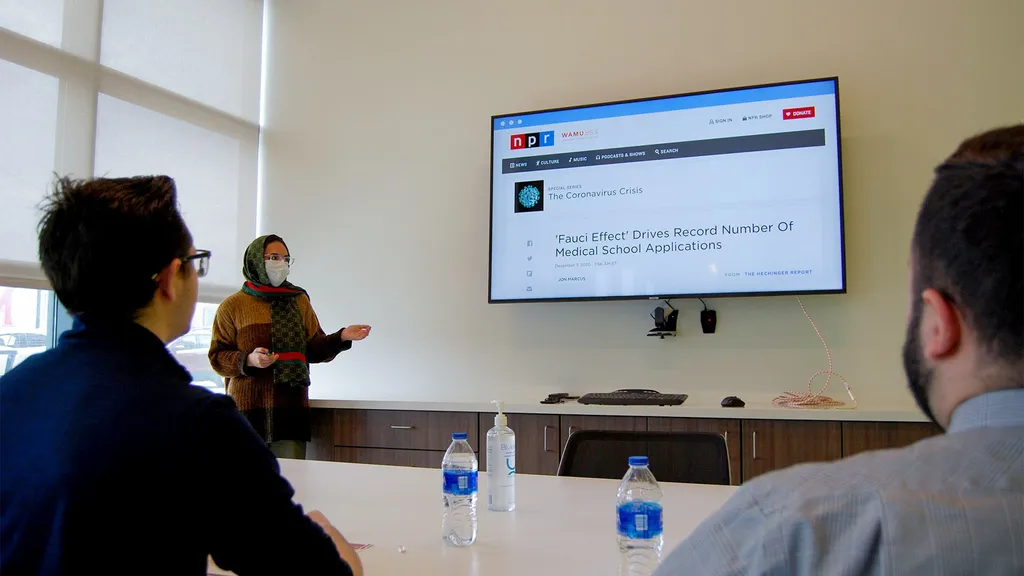- June 01, 2022
- By Shannon Clark M.Jour. ’22
While most of her peers were stuck at home in 2020, Minahil Cheema ‘22 was on the pandemic frontlines, suited up in PPE gear and swabbing staffers for COVID-19 at Baltimore Washington Medical Center.
She was gaining invaluable shadowing experience for her medical school applications, but it didn’t sit right with her that her peers' shadowing hours were put on pause. Cheema snatched the opportunity to create TeleShadowing, a free program offering pre-health students at universities around the globe virtual shadowing hours. Though she graduated last month with her bachelor’s degree in biological sciences, the program is still going strong with live and recorded segments with doctors; so far 5,000 students have taken advantage of it.
“In the past, (physicians) were only able to take in two to three students in person,” said Cheema. “But now, they are able to share their stories, their career paths and journeys to virtually an unlimited number of students.”
During her volunteer hours with the R Adams Cowley Shock Trauma Center in Baltimore, Cheema partnered with physicians to help host weekly two-hour virtual shadowing sessions. They include an overview of a typical workday for a specific physician, followed by a lecture with simulated patient case studies.
Her mother, Dr. Asima Cheema, an internal medicine specialist with her own practice in Maryland, helped to kick-start TeleShadowing as one of its pioneer medical directors.
“Shadowing hours can help show medical programs the dedication and interest a student may have for a certain speciality,” said Cheema, who now serves as United States medical director for TeleShadowing.

Minahil Cheema received support from TeleShadowing through the university’s Do Good Institute, being selected as an Accelerator Fellow, winning a mini-grant and competing in the Do Good Challenge, winning third place this year. She also served as a Do Good Ambassador and took a Do Good course, leading to her selection of a Do Good Medallion for commencement.
“She is so passionate about helping others, especially in health care access, and this dedication comes through in how incredibly hard she works creating and running TeleShadowing, being involved with other health care organizations, and in her pre-med studies,” said Cali Moore, the institute’s program coordinator. “I have no doubt that she will continue to achieve great things and make a difference for equitable health care or for any other issue she may support in her future.”
Following the sessions, participants complete a short quiz and receive a certificate documenting their hours. Since February 2021, TeleShadowing, led by Cheema, her sister, Aamna ’26, Abeni “Amira” Kazi ’23 and Raneem Megahed ’23 and non-UMD students, has provided participants with over 130 hours of live virtual shadowing experience.
“I graduated from high school in Egypt, so volunteer opportunities and shadowing hours are not available overseas,” said Raneem Hamada ‘23. “TeleShadowing gave me an opportunity to complete critical shadowing hours for medical school applications, virtually.”
In June 2021, TeleShadowing partnered with the University of Maryland School of Medicine to provide research interns the opportunity to gain hours through virtual shadowing. The program has extended to over 5,000 students internationally through a campus ambassadors outreach program.
Even as in-person shadowing opportunities have resumed, Cheema believes the future of telemedicine will remain.
“We do know that students, even before the pandemic, were struggling to find opportunities to shadow,” she said. “TeleShadowing provides a free, accessible solution to these problems and our team is working on virtual patient simulation case studies to provide patient interaction opportunities.”
After graduating one year early from UMD, Cheema will spend the next year getting professional experience working in health policy for the state. She hopes to attend medical school in Fall 2023.
“I intend on maintaining TeleShadowing for the rest of my life,” she said. “Hopefully one day, I will be the provider and have someone shadowing me.”
